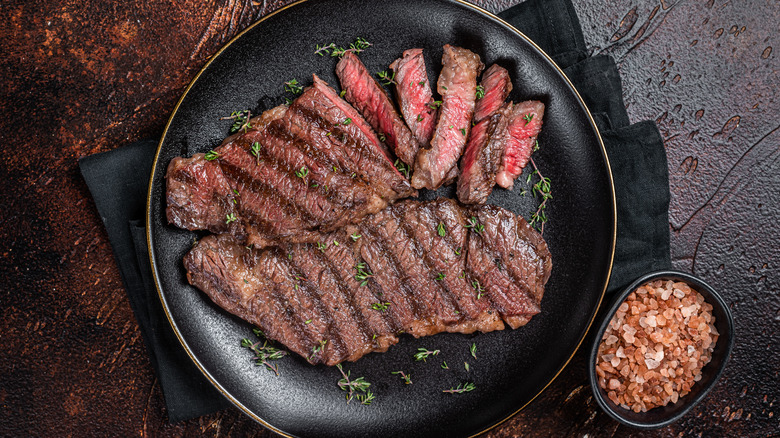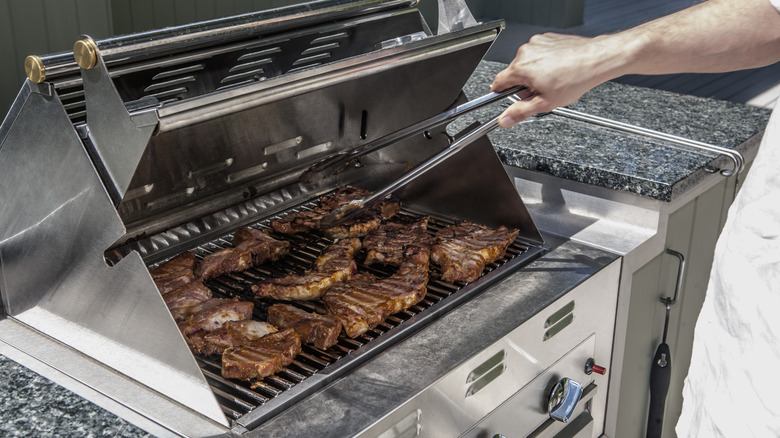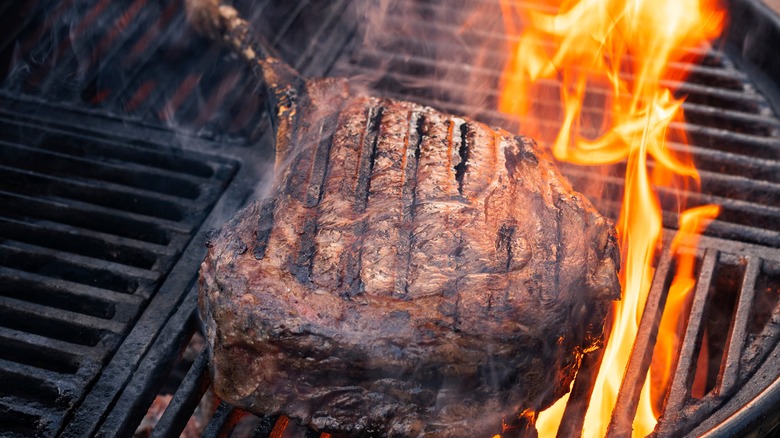Is Gas Or Charcoal Better For Grilling Steak?
The food world is chock full of rivalries: There's Chestnut vs. Kobayashi, Coke vs. Pepsi, Twizzlers vs. Red Vines, and of course Team Gas Grill vs. Team Charcoal. While we'll leave you to argue amongst yourselves about the first three, we do have a definitive answer as to what the best type of grill is for cooking that steak thawing in your fridge: The one that's already set up in your yard, duh, since it's a bit late to run out and buy a new one and then go through the hassle of setting it up. If that steak is still in the freezer and you're in the market for a new grill, though, which kind should you pick? We spoke with K.C. Gulbro, a restaurateur who serves as a chef ambassador for Certified Angus Beef and also co-owns Illinois eatery FoxFire and event venue Copper Fox. As it turns out, he's Team Gas all the way (well, most of the way).
Gulbro tells us, "I prefer using a gas grill for most of my meats because it's clean and easy to manage." Aside from the relative ease of operation, he also likes the fact that the gas flame doesn't influence the flavor much. As he says, "You get a true flavor of the meat you are cooking, and when marinating or seasoning, you will taste more of it" (Speaking of marinades, Gulbro feels these are only necessary when grilling certain steaks, while others are okay without them).
What's good about gas grills
Going by what K.C. Gulbro has to say, gas grills may be the best bet for newbie grillers. He describes the appliance as "easy to control," and adds that it "provides more even cooking, less mess, and [is] less hands-on than other methods." In other words, it's pretty much like cooking on a gas stove, only outdoors. Charcoal, he says, can be "tricky to work with" since it's harder to maintain a set level of heat when you're just eyeballing the flame instead of turning a dial. In his opinion, this heat source can also give the meat what he calls "an unsatisfying chemical flavor."
Propane also heats up much more quickly than coals — turn a knob, and you've got flame. What's more, cleanup is a lot easier, since if you turn that knob the other way, the flame goes away all by itself and you won't have any messy briquettes or charcoal dust to deal with. Finally, with a gas grill, two-zone grilling is a no-brainer: turn off one or more of the burners and you've got yourself a cool zone. To achieve the same result with a charcoal grill, you'd need to pile the coals on one side before you light them, so you can't just decide that a heat-free spot would come in handy once grilling is already underway.
Here's where charcoal has the edge
One big advantage that charcoal grills have over gas ones is that they tend to be more budget-friendly. Even a low-end gas grill may run you about $100 or so, but a charcoal one can be had for as little as $20. Charcoal grills burn hotter than gas ones, too, which makes for a harder sear on the steak. Charcoal grills can also pull double duty as meat smokers – technically, you can do this with a gas grill, but the results are less satisfactory.
The main reason why so many people pick charcoal over gas, though, is because of the way charcoal-grilled food tastes. Even K.C. Gulbro admits "Charcoal ... can infuse a unique flavor that gas grills can't achieve." This is due to a chemical compound called guiacol that is released by burning wood, and charcoal briquettes do contain wood, even if it's only sawdust. Guiacol is what provides a smoky flavor that gas grillers can only hope to duplicate by wrapping their steaks in bacon. Even though charcoal grills are messier and less user-friendly, many of those in the r/grilling subreddit swear that the flavor makes it all worthwhile.
Ultimately, this is a question of personal preference. If you love the ease and the pure, meaty taste of a gas grill, you should choose that. If, however, you value the high temperature and smoky flavor of charcoal, you may find gas disappointing.


